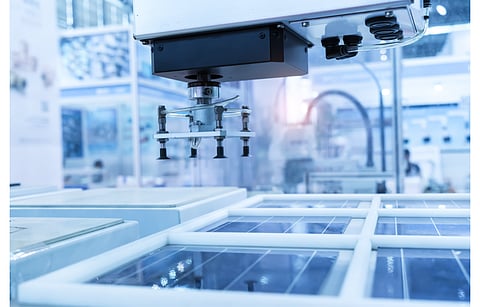

As solar PV industry in the European Union (EU) targets vertically integrated solar manufacturing with 30 GW annual capacity by 2025, the European Commission's (EU) formal endorsement to a new Solar Photovoltaic Industry Alliance steers the bloc towards becoming self-reliant for its solar manufacturing needs.
"To meet Europe's renewable energy objectives — and avoid replacing a dependency on Russian fossil fuels with new dependencies — we are launching an industrial alliance for solar energy," said EC Commissioner responsible for the Single Market, Thierry Breton. "With the alliance's support, the EU could reach 30 Gigawatt of annual solar energy manufacturing capacity by 2025 across the full PV value chain." Interestingly, the 30 GW target is higher than the ask of the European solar industry for at least 25 GW by 2025, which it considered realistic, taking into consideration that ingot, wafer and cell manufacturing capacities each are less than 1 GW in the EU today.
However, having its own manufacturing facilities for the entire solar value chain is to help the bloc achieve its 750 GW DC/600 MW AC installed solar power capacity target by 2030 with low-carbon footprint, as envisioned in the REPowerEU plan (see EU Announces 600 GW AC Solar Target By 2030).
The alliance will comprise all solar stakeholders including industry, research institutes, consumer associations, NGOs among others to create an action plan for the solar industrial value chain in Europe. It will also engage will the EU and member states regarding research and innovation, technology, industrial supply chain, raw materials, offtakers, access to finance, sustainability, even international partnerships.
The commission will now open a call for membership to the alliance to be published in November 2022. It will work with the EITInnoEnergy to establish it on the lines of another successful industry alliance, Battery Alliance.
European solar PV lobby association SolarPower Europe's (SPE) Policy Director Dries Acke welcomed the EC move stating, "Work on the new Alliance comes at a crucial time – in a globally competitive solar manufacturing landscape, diversifying the value chain and boosting European solar PV manufacturing will reinforce the European Commission's energy security and solar deployment ambitions."
The EC move will also give a vote of confidence to existing manufacturers in the region to stay put after Maxeon Solar Technologies shuttered its French module factory recently citing challenging price environment. The company told TaiyangNews however, that it would be willing to re-establish manufacturing capabilities in Europe provided there is a policy framework for localized solar supply chains (see Maxeon Solar's French Production Line Discontinued).
Recently, 13 European and American solar CEOs wrote to the EC demanding stronger and bold action to promote local PV manufacturing at scale taking a cue from the US and India (see Solar CEOs Demand Bold Action From European Commission). The first European solar companies already start to focus on expansion in the US. Though manufacturing and expanding in Germany, European HJT cell/module pioneer Meyer Burger from Switzerland is now heavily leaning to the US, where it also landed a 3.75 GW to 5.0 GW module order from US renewable energy developer DE Shaw Renewable Investments (DESRI) for utility scale projects, to be delivered within 5 years starting from 2024 (see 3.75 GW DESRI Order For Meyer Burger In US).
Interestingly, as the EU PV Industrial Alliance is taking shape, end of September the German Feder Ministry for Economic Affairs and Climate Action (BMWK) has suggested to create a Platform for Transformational Technologies with the 'aim and the unique feature of the initiative to develop and promote the EU's industrial production capacities in 5 strategically important technologies – wind energy, photovoltaics, electrolysers, electricity grids and cables, and heat pumps – large and small.' The reason: "The EU's industrial production capacities are to be increased in order to be able to meet the growing demand for transformational technologies more strongly from domestic European production."
Now the big question is if EU policy makers are fast enough to turn the tide and attract companies to invest in massive solar manufacturing all along the value chain in the European Union too rather than the US? Or if the business model for the EU's world class research institutes will be in the long run to cater primarily to non-EU solar producers? Germany's largest solar research institute Fraunhofer ISE just signed an R&D contract with Europe's only solar wafer-to-module producer Kalyon in Turkey (see Kalyon & Fraunhofer ISE To Research On Integrated PV).
The official launch of the European Commission's European Solar Photovoltaic Industry Alliance will take place in Brussels on Dec. 9.
